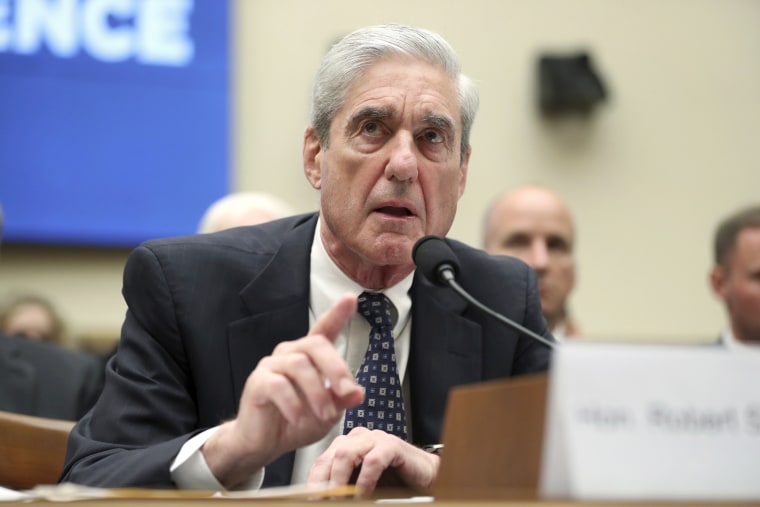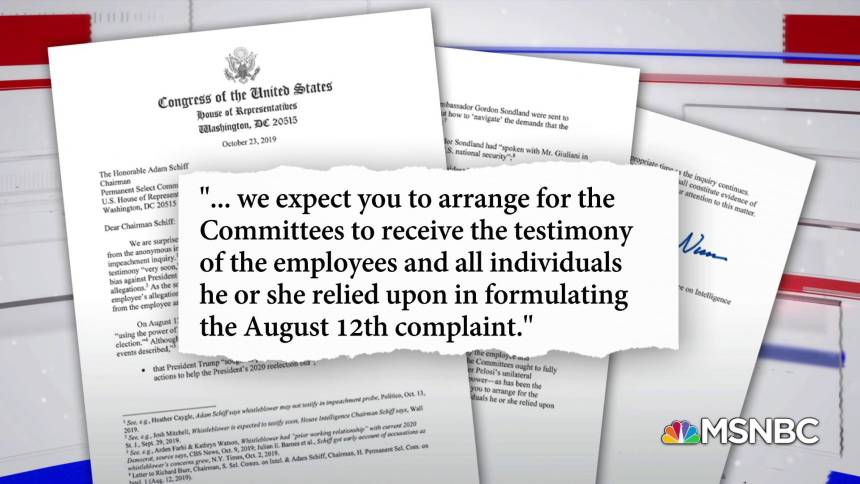NBC News
Judge orders DOJ to turn over Mueller grand jury evidence
The judge also determined, despite arguments to the contrary from the White House, that the House had launched “an official impeachment inquiry”

Former special counsel Robert Mueller testifies before the House Intelligence Committee hearing on his report on Russian election interference, on Capitol Hill on July 24, 2019.Andrew Harnik / AP file
Beryl Howell, the chief judge for the Washington, D.C. district court, ordered DOJ to turn over the materials by Wednesday, Oct. 30.
“The Department of Justice claims that existing law bars disclosure to the Congress of grand jury information,” Howell wrote in the 75-page ruling. “DOJ is wrong.”
The ruling — which DOJ is expected to appeal — would allow House investigators to see redacted portions of the report that involve Donald Trump Jr.’s trump tower meeting with Russians promising dirt on rival candidate Hillary Clinton, former Trump campaign manager Paul Manafort’s sharing of internal polling data with a Russian business associate, and “information about what candidate Trump knew in advance about Wikileaks’ dissemination in July 2016 of stolen emails from Democratic political organizations and the Clinton campaign,” the judge noted.
Howell found that despite public protestations from the Trump administration that House Democrats have not actually launched a formal impeachment inquiry against President Donald Trump, one is underway.
The White House Counsel’s office has refused to cooperate with the inquiry, arguing it’s illegitimate because the House didn’t hold a formal vote to declare one.
Howell said that standard is “cherry-picked and incomplete, and more significantly, this test has no textual support in the U.S. Constitution.”
“Even in cases of presidential impeachment, a House resolution has never, in fact, been required to begin an impeachment inquiry,” Howell wrote.
The Judiciary Committee “has shown that it needs the grand jury material referenced and cited in the Mueller Report to avoid a possible injustice in the impeachment inquiry,” and that the “need for disclosure is greater than the need for continued secrecy.”
“Impeachment based on anything less than all relevant evidence would compromise the public’s faith in the process,” she added.
Howell, who was nominated to the bench by Trump predecessor Barack Obama, also shot down DOJ’s argument that an impeachment proceeding is not a form of judicial proceeding.
“Contrary to DOJ’s position — and as historical practice, the Federalist Papers, the text of the Constitution, and Supreme Court precedent all make clear— impeachment trials are judicial in nature and constitute judicial proceedings,” Howell wrote.
The judge ordered the information turned over by next week, saying White House stonewalling has added to the urgency.
“The White House’s stated policy of non-cooperation with the impeachment inquiry weighs heavily in favor of disclosure. Congress’s need to access grand jury material relevant to potential impeachable conduct by a President is heightened when the Executive Branch willfully obstructs channels for accessing other relevant evidence,” she wrote.
House Judiciary chair Jerry Nadler, D-N.Y., said he was “gratified” by the judge’s ruling.
“The court’s thoughtful ruling recognizes that our impeachment inquiry fully comports with the Constitution and thoroughly rejects the spurious White House claims to the contrary. This grand jury information that the Administration has tried to block the House from seeing will be critical to our work,” Nadler said.
Howell appeared to tip her hand on how she felt about some of DOJ’s legal arguments during an Oct. 8 hearing in the case, when a Justice Department lawyer said the agency should not have turned over grand jury information to Congress in the Watergate proceedings.
“Wow, OK,” Howell said.

